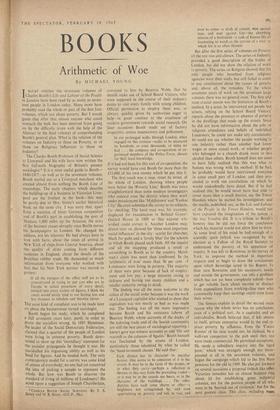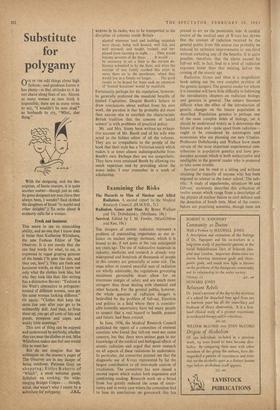BOOKS
Arithmetic of Woe
By MICHAEL YOUNG
IDOUBT whether the seventeen volumes of Charles Booth's Life and Labour of the PeoPle in London have been read by as many as seven- teen people in London today. Many more have probably read the whole or part of the first four volumes, which are about poverty. But I would guess that after that almost anyone who could stomach the bulk has been deterred from going on by the difficulty (even with the help of the Abstract in the final volume) of comprehending Booth's general plan. What is the relation of the volumes on Industry to those on Poverty, or of those on Religious Influences to those on Industry?
The Charles Booth Professor of Social Science at Liverpool and his wife have now written the first full-scale biography of Britain's pioneer sociologist.* It is a most useful guide to Booth- 1840-1917—as well as to the seventeen volumes. Booth started out as a Liverpool merchant who created almost from nothing the Booth Line of steamships. The early chapters which describe the building-up of a business in Victorian Liver- pool are the liveliest in the book—this may be partly due to Mrs. Simey's earlier historical book on the same city. I was sorry that, apart from a mention of bitter German competition and of Booth's part in establishing the port of Manaos, 1,000 miles up the Amazon, the story of the business ceases abruptly once BoOth moves his headquaVers to London. He changed his address, not his interests. He had always been in love with facts, about the times of arrival in New York of ships from Central America, about the quality of skins coming from different tanneries in England, about the details of the Brazilian rubber trade. He demanded 'so much information from everyone who worked with him that his New York partner was moved to protest : If all the energies of the office staff are to be concentrated in trying to put you who are in Europe in actual possession of every detail, twisted into every variety of figures, I think the result would surely tend to our having less and less business to tabulate and theorise about.
The same kind of complaint was to be made later on about the businessman turned sociologist.
Booth began his study, which he completed a full seventeen years later, partly in order to prove the socialists wrong. In 1885 Hyndman, the leader of the Social Democratic Federation, claimed that a quarter of the people of London were living in extreme poverty. Booth deter- mined to show up this 'incendiary' statement for the socialist propaganda he thought it was. He marshalled his organising ability as well as his head for figures. And he needed both. The only contemporary model for a survey was some kind of census of everybody; no one had yet conceived the idea of picking a sample to represent the whole. But how was Booth to discover the standard of living of millions of Londoners? He acted upon a suggestion of Joseph Chamberlain,
* CHARLES BOOM—SOCIAL SCIENTIST. By T. S.
Simey and M. B. Simcy. (O.U.P., 30s.) conveyed to him by Beatrice Webb. that he should make use of School Board Visitors, who were supposed in the course of their ordinary duties to visit every family with young children. Official permission to employ them was, as always, quickly given by authorities eager to help--in great contrast to the crustiness of modern government towards social research. On later occasions Booth made use of factory inspectors, census enumerators and policemen.
In our prolonged walks through London, when engaged on this revision—walks to be measured
by hundreds, or even thousands, of miles we had . . . the company and co-operation of ex- perienefd members of the Police Force, chosen for their local knowledge.
If it had not. been for this sort of co-operation, the survey would have cost Booth far more than the £33,000 of his own money which he put into it.
The first result was a map, street by street, of the whole of London, showing where people were below the Poverty Line.' Booth was more straightforward than some modern investigators who conceal even the district where they work under pseudonyms like 'Middletown' and 'Yankee City.' He even submitted the survey to its subjects. for checking. The local map was, for example. displayed for examination in Bethnal Green' Oxford House in 1888 so that anyone who wished could correct it. Another London map. drawn later on. showed the 'three most important social influence.' in the city: scarlet for churches, black for pubs and a 'lovely blue' for the schools in which Booth placed such faith. All the inquiry and all the mapping produced a result as astonishing to Booth as to the country. Hynd- man's claim was more than confirmed. In the 'arithmetic of woe' more than 30 per cent. of Londoners were living in poverty. The majority of them were poor because of lack of employ- ment and low pay, a large minority owing to sickness and having too many children and a smaller minority owing to drink.
The finding was all the more welcome to the critics of the social order because it was the work of a Liverpool capitalist who wanted to show that capitalism was not nearly as bad as was made out. The finding was all the more impressive because Booth and his assistants (above all Beatrice Webb, whose accounts of the docks, of the tailoring trade and of the Jewish community are still the best pieces of sociological reporting I know) gave eye-witness accounts to add 'life and warmth to the columns of figures.' Booth himself was fascinated by the streets of London, particularly those inhabited by what he called the 'hand-to-mouth classes.' He said that :
Each district has its character—its peculiar flavour. One seems to be conscious of it in the streets. It may be in the faces of the people, or
in what they carry—perhaps a reflection is thrown in this way from the prevailing trades—
or it may be in the sounds one !tsars, or in the character of the buildings. . . . The other districts have each some charm or other—a brightness not extinguished by, and even appertaining to, poverty and toil, to vice, and
even to crime—a clash of contest. man against man, and man against fate—the absorbing interest of a battlefield—a rush of human life as fascinating to watch as the current of a river to which life is so often likened.
But after the first series of volumes on Poverty all the rest was anti-climax. The series on Industry provided a good description of the trades of London, but did not show the relation of work to poverty. The series on Religion showed that the only people who benefited from religious agencies were their staffs, but still failed to come to any conclusions about the causes of poverty and, above all, the remedies. To the whole seventeen years of work on the seventeen large volumes there was no general issue. The first and most crucial reason was the limitation of Booth'; method. In a sense, he interviewed not people but streets, relying on the School Board Visitors' reporti about the presence or absence of pover y in the dwellings that made up the streets. Since he did not have information about the jobs or religious attendance and beliefs of individual Londoners, he could not make any correlations; he could not say whether the people working in one industry rather than another had lower – wages or more casual work, or whether people who belonged to a church drank more or less alcohol than others. Booth himself does not seem to have fully realised that this was what at bottom was wrong with his method. if he had. he probably would have interviewed everyone in some small part of London, and then pro- ceeded to work out correlations on which he would undoubtedly have doted. But if he had realised this, he would never have had time to cover more than a small district, say the Tower Hamlets where he started his investigation; and the results, published, say, as the Life and Labour of the People in the Tower Hamlets, would not have captured the imagination of the nation 'n the way London did. It is a tribute to Booth's honesty that he did not force the conclusion which his material would not allow him to draw. At some level of his mind he had enough of a
scientific spirit (which was recognised by his election as a Fellow of the Royal Society) to understand the poverty of his apparatus of inquiry. It was left to Rowntree, in his survey of York, to improve the method in important respects and to begin to draw the conclusions upon which Beveridge acted in his Report. In their turn Rowntree and his successors, inside and outside the government, ran into a problem which has not yet been completely solved—how to get reliable facts about income as distinct from expenditure from working-class men who customarily keep their earnings secret even from their wives.
The Simeys. explain in detail the second main reason why the whole series has no conclusion, even of a political sort. As a capitalist and an individualist, Booth believed that, if kft almost to itself, private enterprise would in the end re- place poverty by affluence. Even the 'Cocoa Rooms' of his time would not, he claimed, be
well-run competitor to the pub until they too were made commercial. He permitted exceptions.
He made a subsidiary inquiry into the 'aged poor,' which was strangely enough not incor- porated at all in the seventeen volumes, and
began the campaign which led to the first State pensions for the old in 1909. He also put forward on several occasions a proposal (which like other Victorian remedies has an almost Stalinist ring about it) for establishing great industrial colonies, not for the poorest people of all who were to be 'harried out of existence,' but for the next poorest class. This class, including many widows in its ranks, was to be transported to the discipline of colonies inside Britain
planted wherever land and building materials were cheap; being well housed, well fed, and well warmed; and taught, trained, and em- ployed from morning to night. . . . They would become servants of the State. . . . It would . . . be necessary to set a limit to the current de- ficiency submitted to by the State, and when the account of any family reached this point to move them on to the poorhouse, where they would live as a family no longer. . . . The good tesults to be hoped for from such an extension of 'limited Socialism' would be manifold.
Fortunately perhaps for his reputation, however, he generally preferred the manifold benefits of limited Capitalism. Despite Booth's failure to draw conclusions about welfare from his own work, the paradox is that he probably did more than anyone else to establish the characteristic British tradition that the concern of 'social science' is with problems of practical policy.
Mr. and Mrs. Simey have written an exhaus- tive account of Mr. Booth and of his wife who acted as the hidden editor of all the volumes. They are so sympathetic to the people of the book that their style has a Victorian touch which makes it at times almost indistinguishable from Booth's own. Perhaps they are too sympathetic. They have even emulated Booth by allowing too much repetition and by providing about the worst index I ever remember in a work of scholarship.











































 Previous page
Previous page